

PatientsLikeMe signs five-year data access deal with Genentech. Boston-based PatientsLikeMe, a hub for crowd-sourced patient data and an open research platform, has announced its most wide-reaching pharma partnership yet, a five-year agreement to share data with Genentech, a division of Roche.
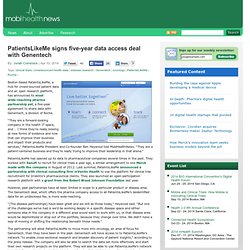
“They are a forward-looking company in the health IT space, and … I think they’re really looking at new forms of evidence and how that can improve their business and impact their products and services,” PatientsLikeMe President and Co-founder Ben Heywood told MobiHealthNews. “They are a patient-centered business and they’re really trying to improve their leadership in that arena.” PatientsLikeMe has opened up its data to pharmaceutical companies several times in the past. They worked with Sanofi to recruit for clinical trials a year ago, a similar arrangement to one Merck made with the company in August of 2012.
How Genentech taps into online patient communities to improve clinical trials. Roche subsidiary Genentech is no stranger to online patient communities — the pharma company signed a five-year data access deal with online patient community company PatientsLikeMe in April.
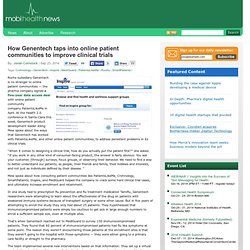
At the Health 2.0 conference in Santa Clara this week, Genentech product development leader Joling Mew spoke about the ways that Genentech has worked with PatientsLikeMe, and other online patient communities, to address persistent problems in its clinical trials. “When it comes to designing a clinical trial, how do you actually put the patient first?” She asked. The perils and pitfalls of “patient-driven” clinical research.
Dying of cancer can be a horrible way to go, but as a cancer specialist I sometimes forget that there are diseases that are equally, if not more, horrible.
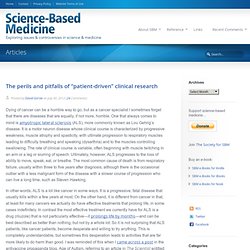
One that always comes to mind is amyotropic lateral sclerosis (ALS), more commonly known as Lou Gehrig’s disease. It is a motor neuron disease whose clinical course is characterized by progressive weakness, muscle atrophy and spasticity, with ultimate progression to respiratory muscles leading to difficulty breathing and speaking (dysarthria) and to the muscles controlling swallowing. The rate of clinical course is variable, often beginning with muscle twitching in an arm or a leg or slurring of speech. RWJF awards Calit2 project $1.9M to explore health data sharing. The Health Data Exploration project, developed at the University of California San Diego and the University of California Irvine, received a $1.9 million grant from the Robert Wood Johnson Foundation (RWJF).
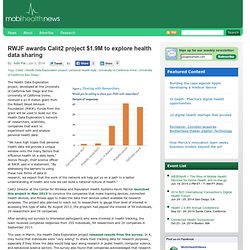
Funds from the grant will be used to build out the Health Data Exploration’s network of researchers, scientists, companies that want to experiment with and analyze personal health data. “We have high hopes that personal health data will provide a unique window onto the many factors that influence health on a daily basis,” Alonzo Plough, chief science officer at RWJF, said in a statement. In-Depth: How patient generated health data is evolving into one of healthcare’s biggest trends.
What patient generated data used to be and why it is increasingly important Dr.
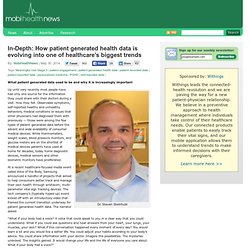
Steven Steinhubl Up until very recently most people have had only one source for the information they could share with their doctors during a visit: How they felt. Observable symptoms, self-reported healthy and unhealthy behaviors, medical conditions or issues that other physicians had diagnosed them with previously — those were among the few types of patient generated data before the advent and wide availability of consumer medical devices. PatientsLikeMe signs five-year data access deal with Genentech. On Anxiety. I was jogging the other day across a wide intersection when a black SUV turned into me.
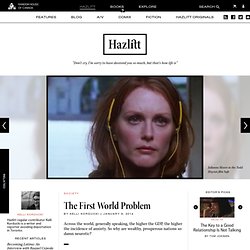
The thing missed me by inches, only—in retrospect—thanks to a moment of uncharacteristic agility, purely evolutionary, that allowed me to dodge its path. Presented with the real threat of a bigger, faster menace, my body threw together a little cocktail of epinephrine and cortisol to bound me out of danger’s way.
The Toyota was my sabre tooth tiger. And then I got righteously pissed. This is where I admit to calling the driver a fucktard. An investigation into the strength of my character spun at 80 beats per minute, in half-step with my Nikes’ slaps on the pavement, and it kept on for days. Join The Movement!#the-movement. The Deadliest Diseases Could Be Prevented Or Cured By This Website Is ‘It’? "It" is our fixation to forever alter the way we all think about and treat diseases.
What Can Do? Right now, you can help raise awareness for this movement. As more action becomes available, like the ability to safely share your genetic data or medical records so that doctors and researchers can truly understand a unique illness on an individual level, we'll ask you to consider deepening your dedication. Spread The Word Build The Database Connect The Pieces Cure The People. Cashing in on patients’ experiences: the commodification of patient support and opinion websites.
Reg4All: System for Connecting Health Information. Bio Sharon Terry Sharon F.
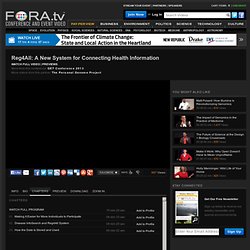
Terry is President and CEO of Genetic Alliance, a network of more than 10,000 organizations, of which 1,200 are disease advocacy organizations. Genetic Alliance enables individuals, families and communities to reclaim their health and become full participants in translational research. She is the founding CEO of PXE International, a research advocacy organization for the genetic condition pseudoxanthoma elasticum (PXE). To download this program become a Front Row member. ZOOM IN: Learn more with related books and additional materials. For related Britannica content, please search on Britannica's Web site, at www.britannica.com. Innovator Under 35: Paul Wicks, 30. Each day, thousands of people around the world open an automated e-mail asking, "How do you feel now?
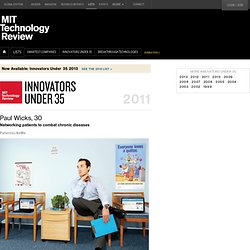
" The e-mail's recipients belong to a social network called PatientsLikeMe, and nearly all have been diagnosed with a life-changing illness such as epilepsy, Parkinson's, chronic depression, or amyotrophic lateral sclerosis (ALS, also known as Lou Gehrig's disease). By answering this simple question, they are participating in an ambitious experiment that is challenging conventional ideas about health care and accelerating the pace of medical research. The primary architect of this experiment is Paul Wicks, a neuropsychologist and the director of research and development at PatientsLikeMe. Wicks joined the company in 2006, two years after it was founded by MIT-trained engineers James and Benjamin Heywood and their friend Jeff Cole. Their original aim was to garner ideas for extending the life of the Heywoods' brother, Stephen, who had been diagnosed with ALS at age 29.